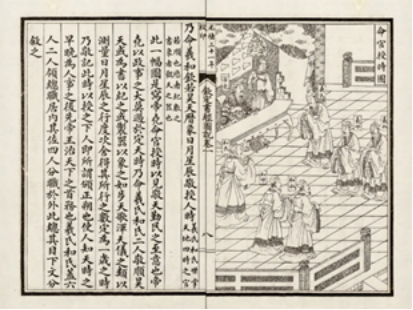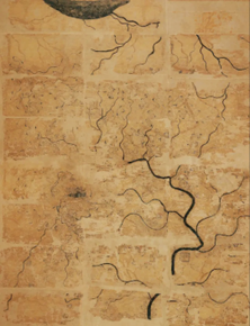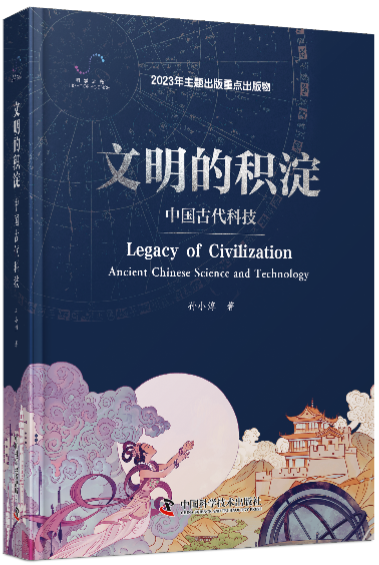History is the window through which we can gain insight into a civilization. April 23, 2024, marks the 29th World Book Day, and on this occasion, a book titled Legacy of Civilization: Ancient Chinese Science and Technology is unveiled. Published by the China Science and Technology Press, it offers an insightful overview of ancient Chinese technology from the perspective of civilization.

A replica of Zhang Xuan’s Dailin Tu (搗練圖) (The Picture of Pounding)
Photo credit: WeChat official account of the CAST
Science and technology, as an integral part of the glorious Chinese civilization, have made substantial contributions to the development of China and the world.
Science and technology have become the dominant driver of the national and social development of China. Therefore, delving into the history of science and technology in China not only fosters a deeper understanding of the nation's cultural heritage, but also bolsters our acknowledgement of the global significance of Chinese civilization. This, in turn, enhances China’s cultural confidence in the contemporary era.
Tracing the History of China's Technological Development
All great civilizations have made contributions to the development of technology. The river of history flows ceaselessly, yet only Chinese civilization has endured thousands of years of tribulations without interruption. China's rich culture and civilization stand on solid ground, supported by related archaeological and historical evidence.
Although there is no written record of China's prehistoric civilization, archaeological discoveries have provided abundant evidence of the country's technological advancements during this period. These include pottery production, the invention of textiles and agriculture, and the domestication of animals. These innovations of the Neolithic Period played a crucial role in shaping human civilization. Chinese civilization also emerged from the Neolithic Period over 10,000 years ago, establishing a brilliant technological civilization on this oriental land.

An Armillary sphere is housed at the Purple Mountain Observatory.
Photo credit: WeChat official account of the CAST
Viewing China's Sci-Tech History through a Global Civilization Lens
The development of modern science stems from the collaboration and exchange between Eastern and Western civilizations. Since the Ming and Qing Dynasties (before the Opium Wars, from 1368 to 1840 AD), China was not merely a passive recipient when encountering new technologies brought by the Western countries but an innovator and participant in global modern science.

An illustration of the Shu Jing Tu Shuo, a collection of medical works by Sun Jianai in the Qing Dynasty.
Photo credit: WeChat official account of the CAST
As Joseph Needham demonstrated in his work Science and Civilisation in China, China has made significant contributions to modern science through its scientific concepts and findings. The scientific principles and factual truths are universal and borderless, making them a shared treasure for all human civilizations.
These scientific advancements have the potential to transcend cultural boundaries and be shared by people around the world. Meanwhile, it is crucial to recognize that each country has its unique cultural traditions, values, thoughts, and ways of behavior, which constitute the unique characteristics of its scientific culture.

A topographic Map unearthed from the Mawangdui Han Tomb in Hunan in 1973 is the earliest surviving map in China with a coastline.
Photo credit: WeChat official account of the CAST
Human civilization is characterized by a shared identity and diverse expressions. Through constant communication, interaction, and mutual learning, human civilization continues to progress.
Sci-tech inventions often take on unique forms and have varying applications in different cultures, leading to distinct social outcomes. They prove the significance of fostering a community with a shared future for mankind. In the history of communication between Eastern and Western civilizations, technology has always been a unifying force.
Enlightenment from Ancient Chinese Science for the Modern Era
The ancient Chinese technological achievements are linked to its unique traditions, epistemology, methodology, and values.
This book sorts out these characteristics and provides explanations from the perspective of modern science and culture, offering valuable guidance for advancing sci-tech development.
Civilizations are symbiotic and also mutually influential. They draw inspiration and foster creativity across boundaries.
Occasionally, there are direct exchanges and collisions between civilizations. Against the backdrop of globalization, civilization becomes a shared heritage of humanity. As a global superpower, China shows confidence rooted in its profound history and cultural accumulation.
National spirit has been woven through the tapestry of history. As China strives for independence and prominence, it should modernize its traditional values and ethos.
China needs to adopt a forward-looking approach towards the convergence of nature and technological progress. Drawing from the profound wisdom of classical Chinese philosophy, such as the Doctrine of the Mean, which emphasizes the harmony and interconnectedness of all phenomena, and the Xici (a collection of Confucian books traditionally included in the I Ching), which underscores unity amid diversity and complexity.
Future science may not always advance along the historical trajectory set in the 17th century. The scientific spirit in traditional Chinese culture is worth exploring in depth.
The modernization of China requires the formation of a scientific culture, which is deeply rooted in tradition. Neglecting traditional culture hampers the development of a complete scientific ethos. To establish a modern scientific civilization, it is necessary to seek support from traditional culture, foster cultural confidence through traditional values, and enrich the diversity of scientific culture.
By integrating the spirit of science with the essence of the Chinese nation, shaping a scientific mindset within society becomes crucial for fostering innovation and better advancing towards the future.

Legacy of Civilization: Ancient Chinese Science and Technology, written by Sun Xiaochun, published by the China Science and Technology Press
Photo credit: WeChat official account of the CAST
Source: WeChat official account of the CAST, VOC